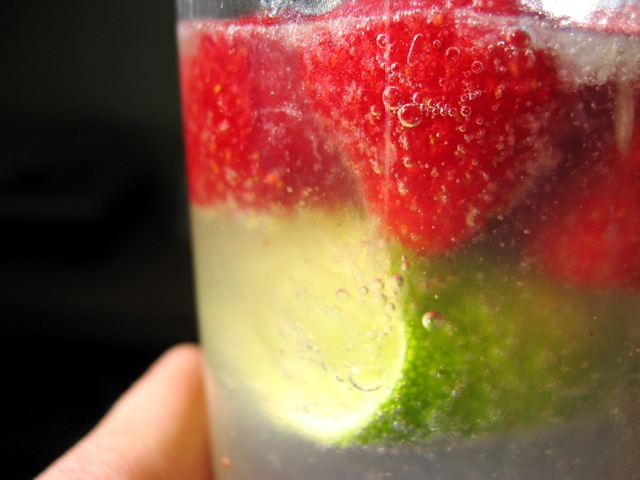
reference-image, l
(article, Marissa Lippert)
[%pageBreakSettings nobreak=true] “I’ve been hearing a lot of conflicting information recently about how much water I should drink per day. Is there a good rule of thumb to follow, and is hydration really linked to good health?" [[block(sidebar). h1.Featured recipes]] Summertime is officially full steam ahead, the perfect time for an ice-cold glass of just about anything. But do you really need to drink eight glasses of water every day? (Answer: No.) And should you switch to a sports drink or vitamin-enhanced water during the summer? (Answer: Maybe.) Read on for a quick refresher course on the relationship between rising temperatures, hydration, and nutrition. h3. Science says . . . First things first: A few recent research studies have caused an icy stir questioning the benefit or necessity of drinking the popularly recommended 64 ounces of water a day. [%image reference-image float=right width=400 caption="Add a slice of lime and frozen strawberries to sparkling water for a summertime thirst quencher."] Although there are many commonly held beliefs about water improving kidney function and complexion (or skin elasticity), as well as suppressing appetite, University of Pennsylvania scientists recently found no significant evidence that drinking a lot of water has any clear benefit. The Penn researchers also stated that although no distinct benefit was uncovered, there’s no major finding of a lack of benefit either. Another review, headed up by Dr. Heinz Valtin of Dartmouth Medical School, concurs with the Penn study, noting that we can get much of our water needs from food, juices, milk, and other drinks like coffee and tea. Yes, caffeinated drinks — commonly believed to “dehydrate” and act as diuretics — actually do contribute to our daily fill of fluids. (Valtin did state the need for increased water consumption with certain medical conditions such as kidney stones.) h3. What your body really needs Despite these recent studies, it's still important to drink water and eat water-rich foods — i.e., fruits and vegetables. Water constitutes more than two-thirds of our body weight, and our cells and organs require it to function properly. Water also helps maintain our body temperature through perspiration and aids digestion by alleviating constipation. When we find ourselves thirsty, it’s a signal of under-hydration; dehydration may not be far behind. Dehydration, particularly in the summer when we perspire more, can lead to fatigue and decreased energy levels. So pay attention to your body: Drink when you’re thirsty. When the temperature spikes, or if you’re outdoors or exercising for an extended period of time (longer than 30 minutes), drink a little more to prevent dehydration and to keep your body temperature properly regulated. The elderly can more easily become dehydrated, simply forgetting to drink water or not wanting to due to concerns around incontinence. Motility (digestive speed) slows as we age, so it's definitely important to drink a sufficient amount for good digestion — and good overall health. We all have different needs and fluid requirements. Drinking too much water (a condition known as water intoxication) can lead to overhydration or hyponatremia, an imbalance in the body’s sodium and electrolyte levels. Hyponatremia is the most common electrolyte disorder in the U.S. and can be life-threatening; symptoms include confusion, decreased consciousness, headaches, fatigue, muscle weakness or spasms, irritability, and loss of appetite. Thankfully, it rarely occurs in healthy adults and children who maintain proper fluid balance. h3. On ice Good ol’ water aside, what about all the other drinks that just scream summertime — lemonade, iced-coffee drinks, fruit smoothies, beer, and frozen cocktails? True, these beverages may add to your daily fluid intake, but they can also rack up calories and excess sugar. Be mindful of your liquid calories, and choose beverages with natural ingredients and minimal amounts of added sugar or sweeteners, if any at all. Go the homemade route and brew up a refreshing pitcher of iced green tea or make a fruit-sweetened spritzer with sparkling water, lime juice, and fresh berries. Bring cantaloupe agua fresca to a barbecue, or freeze a batch of watermelon-mint pops. h3. Sports-drink smarts I’m no marathoner or triathlete, so water’s what I typically reach for after exercising. Still, after intense exercise and extreme heat, you'll need to replenish fluids and electrolytes (such as sodium and potassium). Keep in mind, however, that unless you’re participating in extreme exercise for 90 or more minutes, you can likely leave enhanced sports, energy, and vitamin drinks on the shelf. For a natural alternative to both water and sports drinks, look for coconut water in your local health store or supermarket. It’s a good source of potassium to rehydrate and restore electrolytes in the body. p(bio). Marissa Lippert is a registered dietitian and nutrition consultant in New York City.

reference-image, l